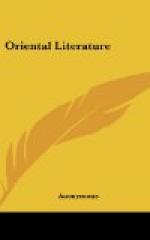When Khaled had heard these words, he cast his eyes to the ground, and remained for some time thoughtful and gloomy. Then he replied: “My mother, I cannot remain here any longer. I must return home amid my horsemen and troops. I have no intention of saying anything more to my cousin; I am convinced that she is a person whose temper and ideas of life are uncertain; her character and manner of speech are utterly destitute of stability and propriety. I have always been accustomed to live amid warriors, on whom I spend my wealth, and with whom I win a soldier’s renown. As for my cousin’s love for me, it is the weakness of a woman, of a young girl.” He then donned his armor, mounted his horse, bade his uncle farewell, and announced his intention of leaving at once. “What means this haste?” cried Zahir. “I can remain here no longer,” answered Khaled, and, putting his horse to a gallop, he flung himself into the depths of the wilderness. His mother, after relating to Djaida the conversation she held with her son, mounted a camel and made her way towards her own country.
The soul of Djaida felt keenly this indignity. She brooded over it—sleepless and without appetite. Some days afterwards, as her father was preparing with his horsemen to make a foray against his foes, his glance fell on Djaida, and seeing how altered she was in face, and dejected in spirit, he refrained from saying anything, thinking and hoping that she would surely become herself again after a short time.
Scarcely was Zahir out of sight of his tents, when Djaida, who felt herself like to die, and whose frame of mind was quite unsupportable, said to her mother: “Mother, I feel that I am dying, and that this miserable Khaled is still in the vigor of life. I should like, if God gives me the power, to make him taste the fury of death, the bitterness of its pang and torture.” So saying, she rose like a lioness, put on her armor, and mounted her horse, telling her mother she was going on a hunting expedition.




